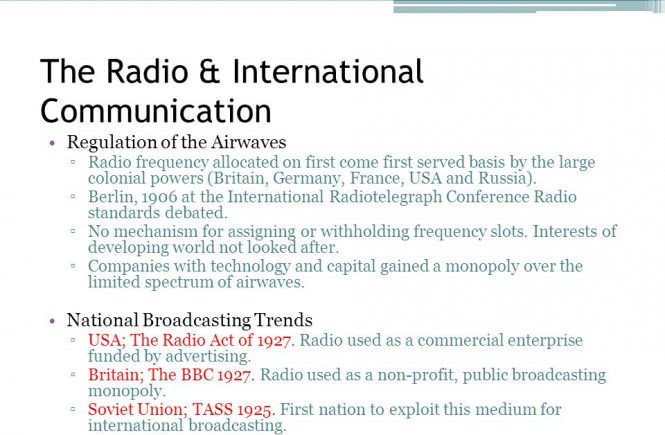As with other new technologies, Western countries were the first to grasp the strategic implications of radio communication after the first radio transmissions of the human voice in 1902. Unlike cable, radio equipment was comparatively cheap and could be sold on a mass scale. There was also a growing awareness among American businesses that radio, if properly developed and controlled, might be used to undercut the huge advantages of British-dominated international cable links (Luther, 1988). They realized that, while undersea cables and their landing terminals could be vulnerable, and their location required bilateral negotiations between nations, radio waves could travel anywhere, unrestrained by politics or geography. At the 1906 international radiotelegraph conference in Berlin, 28 states debated radio equipment standards and procedures to minimize interference. The great naval powers, who were also the major users of radio (Britain, Germany, France, the USA and Russia), had imposed a regime of radio […]
Research , Importance of Research, Aims and Motives
Why Research? Importance of Research. Aims and Motives of social research. What Is Research? Research comprises “creative work undertaken on a systematic basis in order to increase the stock of knowledge, including knowledge of humans, culture and society, and the use of this stock of knowledge to devise new applications.” It is used to establish or confirm facts, reaffirm the results of previous work, solve new or existing problems, support theorems, or develop new theories. A research project may also be an expansion on past work in the field. To test the validity of instruments, procedures, or experiments, research may replicate elements of prior projects, or the project as a whole. The primary purposes of basic research (as opposed to applied research) are documentation, discovery, interpretation, or the research and development (R&D) of methods and systems for the advancement of human knowledge. Approaches to research depend on epistemologies, which vary considerably both within and between humanities and sciences. There are several forms of […]
Contemporary Political Socialization
Chapter 5: Contemporary Political Socialization THEMES IN POLITICAL SOCIALIZATION Political socialization performs a valuable function. It helps a society communicate its political heritage to new generations. We want children to understand the storied history of the United States, both its strengths and shortcomings. We want them to appreciate the importance of freedom, tolerance, and duty to country, as well as the importance of civic engagement. Other countries also convey their political lineage to young members of society, emphasizing distinctive national norms and values. Democratic societies in particular seek to nurture four virtues in citizens: knowledge of the political system; loyalty to democratic principles; adherence to traditions like voting; and identification with citizenship. Two themes weave their way through the socialization of political attitudes: continuity and change. STUDYING POLITICAL SOCIALIZATION You would not find as many children who harbored such uniformly positive attitudes today. On television and the Internet kids are […]
Media and Political Knowledge
Chapter 4: Media and Political Knowledge “A democracy can’t be strong if its citizenship is weak,” observed political scientist William A. Galston (2011). A key requirement for effective citizenship is knowledge. Meaningful democratic decision-making requires that citizens understand basic facts of government and the issues that are at stake in elections. National surveys show that most Americans know key aspects of the U.S. Constitution and civil liberties. Happily, they also know the number of senators from their state. But in a testament to widespread ignorance, just 35 percent know the names of both U.S. senators from their state, only a third can name all three branches of government, and 29 percent believe a person can be tried twice for the same crime. This underscores a time-honored paradox of political communication: There is more information available than ever before, yet citizens’ knowledge levels do not approach normative ideals (e.g., Neuman, 1986). […]
NORMATIVE THEORIES OF MASS COMMUNICATION (Review)
Chapter#5: NORMATIVE THEORIES OF MASS COMMUNICATION During the era of yellow journalism, most media professionals cared very little for the niceties of accuracy, objectivity, and public sensitivities. But in the first decades of the twentieth century, a crusade began among some media industry people and various social elites to clean up the media and make them more respectable and credible. The watchword of this crusade was professionalism, and its goal was elimination of shoddy and irresponsible content. Some sort of theory was needed to guide this task of media reform. The goal of this theory would be to answer questions such as these: Should media do something more than merely distribute whatever content will earn them the greatest profits in the shortest time? Are there some essential public services that media should provide even if no immediate profits can be earned? Should media become involved in identifying and solving social […]
Post Positivism vs Interpretivist approach
Having invested some more energy concentrate the zones of Positivism and Interpretivist in the territory of instructive research I have dissected the fundamental contrasts between the two methodologies with the goal that I can figure out where my position may lie. Post Positivism This is generally regarded as a “scientific” approach with methods used that are highly organised, measurable and based on approaches taken by the scientific community involved in researching behaviours in the natural world. The researcher will not be involved with those involved in the research topic and will often use observations as a method of obtaining information. Martyn Denscombe (1998) describes how for positivists, the aim of social research is to discover the patterns and regularities of the social world by using the kind of scientific methods used to such good effect in the natural sciences. Key features: Scientific Objective Robust Involves identifying causes Tests hypotheses Uses the methods of the natural sciences External reality need to collect ‘facts’ Use of statistics (quantitative) […]
